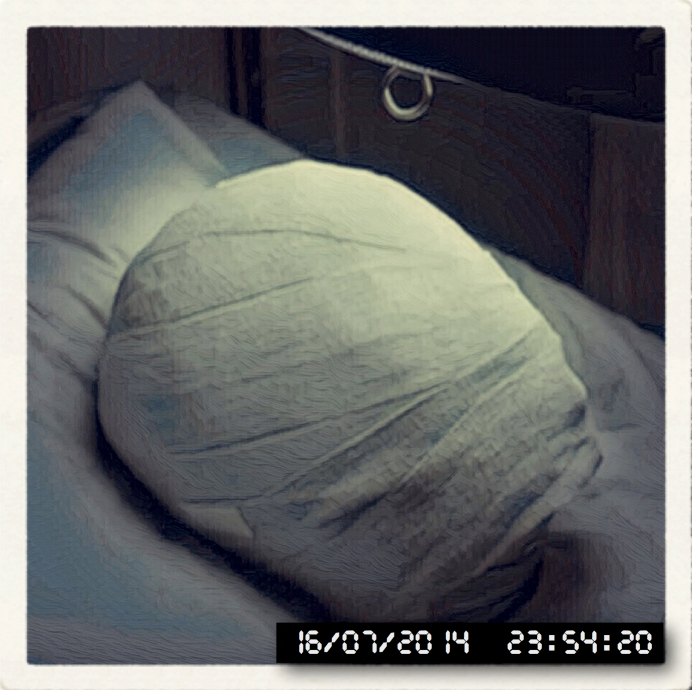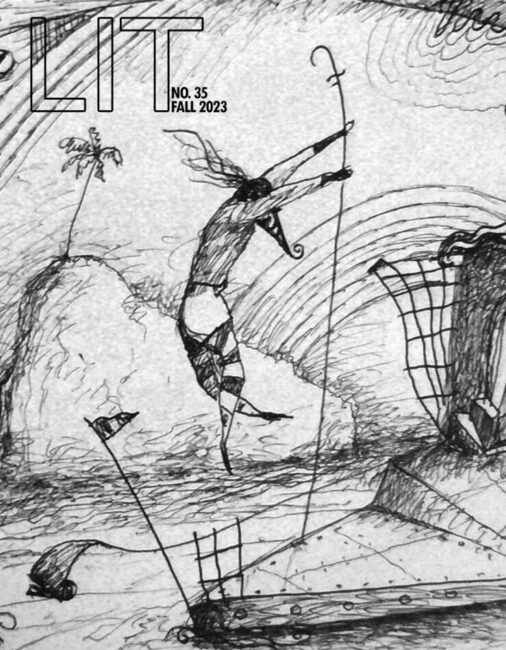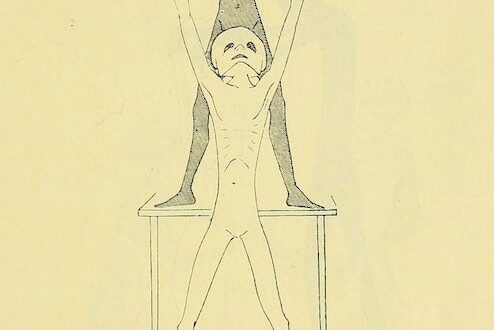
Personal History of the Cherry Bomb
by Bart Plantenga
photo: collection of the author
You and I cannot believe our eyes anymore. Observe: A man on a glimmering stretch of walk in a tight, shiny suit, the kind start-up guys wear, was jimmying the lock on my bike with what could have been a hunting knife.
“HEY!” Startled, he pivoted and dashed off. I gave chase because I’d been reassured by characters seen in crime dramas that chase scenes usually end with their man in cuffs.
He was young, so it surprised me to be gaining on him so quickly. Why? Was it the pace of the infirm or of someone lugging a rucksack filled with a history of entitlement, pedigree, ballast?
Suddenly he stopped, turned, lifted his arm as if to ward me off. Something was released from his raised fist and just as I was opening my mouth to yell “STOP BASTARD,” something entered my oral cavity – and exploded.
•••
When I awoke I was floating in a white room of white walls, sheets and blankets. The woman in white spoke in low, flat tones. I could not hear what she was saying as her lips floated silently away from her face, which some later said was due to the opium. There I lie, ensconced in a universe circumscribed by the thickness and length of a swath of bandages wrapped snugly around my face.
I tried to lift my head but could not. It was dead weight. When I tried to speak, the words seemed trapped somewhere between desire and expression. My name? Something with a “K”.
The nurse wrote on a chalkboard: YOUR HEARING WILL RETURN. She was parsimonious with information. Too much of it was probably unpleasant. And no one ever properly healed from hearing bad news.
Room 307 had no mirrors. There was probably a reason but my mind did not allow me to find one. I was left alone and managed to turn my body to find my warped reflection in the chrome cabinet to the side of my bed. I had the strongest feeling that I was no longer me. That is how I word it now.
I almost laughed at how the imperfect chrome reflection made it seem as if half of my bandaged face had caved in. I screamed but there was no scream. Is there a name for a screamless scream? I thought of that book I read in high school called Johnny Got His Gun. Last name? Something with a “G”?
I dreamed of where I might move to – the north of Scotland, Finland, Yukon with 1 person per 10 square kilometers, an ice floe, somewhere with few people and much darkness so as to never scare locals with the sight of my face.
I discovered later: 1 The guy had been caught; 2 his name is Weston Ellis; 3 an immigrant hero kept him pinned down with his knee on his chest [he refused to tell police his name perhaps fearing deportation]; 4 I was attended to by passersby, one who cradled my head; 5 the far right declared it an act of terror; 6 someone said I made the news; 7 my name is Kees Ge…
•••
When they finally replaced my bandages I had no idea what day, week or year it was. Time was so nutty and no longer fixed to mechanized clicks like they try to tell us it has always been. But science sometimes gets it wrong. They now acknowledge the existence of mind time, which is shaped by the subjective inner life.
I had time to kill so I looked things up on a borrowed phone: The 1-inch cherry bomb contained an est. 45 milligrams of flash powder. Once an ignition fuse is lit, it takes 3 to 4.5 seconds for the firework to explode … banned in the US by federal Child Safety Act of 1966. Knowing this in no way helped my situation, however.
My senses slowly recovered. Although it could have been overnight. It was a miracle they said. But it did not involve religion, although some may have prayed for me without telling anyone. Even my voice returned. There was astonishment, some weeping. I was able to mutter my name: Kees Gesigtloos. I remember the nurse offering a warm smile.
I could now offer my opinions on the reconstructive looks I could choose from in a spiral binder. The nurse gently turned the laminated pages. It did not include my own face, however, so I narrowed my choices to visages that may have resembled Richard “John Boy” Thomas, a young Sam Sheperd, a 60s James Bond, and late-70s Bryan Ferry. Nobody said anything like: “Don’t get your hopes up.”
A visitor, maybe a friend, out of what he thought was earshot made a somewhat lighthearted reference to the Elephant Man. Perhaps to lighten the mood, believing the old saw that laughter is the best cure.
•••
Most surprising to myself, the staff and visitors: I suddenly woke one morning to music on a clock radio, WQXR, and I began to sing along. It was hard to believe I was singing at all, let alone with the voice of an opera singer. It came out of nowhere, out of thin air. Or was it me on the radio? I honestly don’t remember.
Was it the nurse who described me to visitors as “the guy with the angel voice”?
Someone with a background in music declared me a tenor, not an ordinary tenor, but an Italian tenor who could sing in perfect Italian. The condition is called “bilingual aphasia” and usually occurs while one is in a coma.
A woman who owned the FX Lab in Greenpoint donated a special temporary power-mesh, gel-10 silicone mask made in the image of – I thought – Richard Widmark. But maybe I was wrong. It suited me well.
I began to perform from behind my mask, which graciously hid the unspeakable horror. I looked pretty good. Almost believable. We can say that this is what polite society is all about.
Here are some other details: 1 I knew the lyrics to operas; 2 I knew how to sing my part perfectly; 3 I knew Italian but only while singing opera [I could not have a conversation in Italian]; 4 I became somewhat of an overnight sensation, but no one dared attribute it to the “freak show factor”; 5 my pitch, my delivery, my artistry all pointed to years upon years of training and, yet, I had never sung opera before, never liked opera, could not name any operas except for Carmen, and that only because of Malcolm McClaren’s version.
The unbelieving critics, curmudgeonly guardians of high culture, and the boards of operahouses of the world were, however, slowly won over. No doubt because I was selling out venues nightly. They marveled at my impressive coloratura, my “otherworldly” counter-tenor voice that was “capable of negotiating complicated passages of elaborate embellishments with great agility.” My vocal acrobatics were not infrequently compared to the guitar solos of John McLaughlin and James Blood Ulmer in the music press of the day. People compared my performance of the “Star Spangled Banner” in Washington to Jimi Hendrix’s unorthodox performance of it at Woodstock.
People grew more and more intrigued; women were captivated by the mysterious me behind the mask. After concerts they posed with me in photos, giggling nervously in lobbies lined with plush carpet. How bad could the damage be, they speculated. Sometimes they kissed me.
My performances made history, according to some. Reviewers called me heroic, inspiring, enigmatic, godly – and ungodly. I was offered a recording contract and exclusive engagements at great opera houses in great cities.
•••
Investigative journalist friend Millie Blythe presented salient details about the perpetrator: 1 he had been cast the victim by savvy lawyers hired by his dad; 2 was he addicted to viewing sporting events and consuming snacks as the defense had suggested? 3 the media ate it up because I was an alien, reportedly illegal; 4 although I was the victim, it soon became clear that the public prosecutor was losing control of the trial; 5 I was now suddenly being cast as the defendant, the perpetrator.
Although I was able to present my side of the story, I do not remember a single word of what I said. I wondered if my speaking voice was muffled to the point of incomprehensibility. Millie was being honest: “It was painful to hear; the trial was a joke. Mere mention of the defense team attorneys Stanley Shure and Daniel Schmied, made even the most hardened uncross their legs, blink unnaturally, hyperventilate, exhibit profuse sweating.”
Shure read aloud a litany of glowing character witness statements [including one from the former mayor], Eillis’s record of public service, his Wall Street employer. By the end you almost wanted to shake his hand and apologize for getting your face in the way of his cherry bomb.
The official defense consisted of NY Penal Code Section 35.15: someone may use physical force upon another person when he reasonably believes it necessary to defend himself and, part 2: Ellis suffered diminished capacity as a result of depression. The argument was that Ellis had once been a fitness fanatic who grew depressed after an acrimonious separation. He was shunned by mutual friends, quit his six-figure job, turned to massive consumption of sugar-laden junk food, sporting events, alcohol, and the use of a “self-consoling device.”
The employees at Peter Pan Donuts used to refer to him as the “Donut Monster,” because he’d sometimes down half a dozen donuts right there in the shop. This dramatic change in regimen and behavior was symptomatic of his underlying depression.*
The public prosecutor, not the most able of attorneys, lurched for the moral high ground, calling Ellis “a yuckie, a delusionary, pampered, toxic yuppie who suffered from nothing more than acute affluenza.” It sounded good to me but, in hindsight, I think the jury found it all a bit shrill and overly judgmental.
The judge came around, believing the defense’s compelling argument and strongly urged the jury to pursue probation plus 120 hours of community service. The jury agreed.
More details from Millie: 1 Ellis served out his community service at Manhattan’s Teed Off Driving Range, with a view of the world from atop the ChokeKold Building; 2 where he was able to circulate among media, fashion, and finance celebs; 3 rumors of a Trump son connection persisted; 4 Ellis had investments in MaskMaker Studios, the place commissioned to supply me with my post-reconstructive surgically applied permanent mask using the latest 3-D hologram technology; 5 crowdfunding covered part of the $248,000 cost. Irony and coincidence magnify the human tragedy. Thank you very much everyone!
•••
Millie also came to possess a very strange object: documents show that Ellis had in the spring purchased an antique lacquered Italian Mestre Pastille Box for $1993 at a Christie’s auction in Westchester. Don’t bother to ask how she managed to acquire this curio; she’ll simply smirk, and leave it at that.
One day she laid the box out for me on the lacquered table. It contained 6 warped “marbles” that, when gently shaken in the box – she demonstrated – rolled around to create a racket as made by a certain 18th- century percussion instrument no longer in fashion.
The box also came with a certificate of provenance rolled tightly and bound with a yellow ribbon. The document verified its source and origin and provided a detailed background history of its contents.
Irony and coincidence stirred our imagination beyond the tepid everyday because these were no ordinary ancient marbles, like those Roman ones made of clay. Actually not marbles at all. Blythe: “They were … [silence to roll out her punchline] … marble-sized testicles, dried, withered, gruesome even …”
More coincidences: the testicles were from renowned castration, one of whom I had been compared to in an Opera News review. Furthermore, according to Blythe, Ellis had developed a seemingly perfect circular economic model: he had co-invested, with his father, in Bramlett Farm a rural Tennessee illegal fireworks factory that specialized in the Pipe Smoke, M-80s and Cherry Blossoms [small bombs], including the very one that had injured me, which – it gets sicker – brought me to MaskMaker Studios and to TLC Physiotherapy & Rehabilitative Science, both businesses he had stakes in. If I were put together differently I might see it all as a cynical, localized variant of disaster capitalism. Blythe never minced words: “Sowing disaster to reap profits. He’s probably invested in operahouses too.”
Millie, despite tight deadlines, sat on the edge of my bed to read me the reviews: “He reminds one of the last great castrato, Alessandro Moscio, who acquired an almost pornographic level of ‘appreciation’ in the Vatican as he satisfied the taste for ever-more extreme falsetto voices. His tenor talent is most on display in Verdi’s opera, La maledizione (The Curse).”
She read excerpts from the certificate of provenance booklet:
Castrati first arrived from Spain with its tradition of Moorish harem eunuchs serving as bodyguards. … Cutting off the sexual parts of a male teen to prevent their pure soprano voices from being “ruined” by manhood, thus maintaining an aesthetically pleasing, celestial falsetto much desired by Catholic choirs.
These ball-less men sang like boys with manly lungs, enchanting popes, dignitaries, and the rabble alike, distracting one and all from the horrors of the surgical and painful procedure. Pope Pius IX, in 1854, not only defended slavery but called castration “a necessary evil for the Divine Good.” …
The boy was placed in a warm bath to sooth him. The practice of pressing the jugular vein until the boy was unconscious proved dangerous and was replaced by ample doses of opium, leaving him unconscious of the operation that had just robbed him of “those Parts which Nature took so great a care to form.”
The preferred method involved cuplike tongs, heated in an open fire until the metal glowed hot so when the scrotum was cupped, cauterization was “instantly” achieved and the reliquary-ready testicles could be preserved. … Post-mortem studies documented the small dimensions of the larynx and vocal cords, consistent with those of a female high soprano.
Contents:
• Two testicles of Alessandro Moscio (1866-1920): the only castrato to ever be recorded. His unique “way of approaching a head note with an upward ornamented acciaccatura, a curious leap over an upward interval from the medium into the head voice of more than an octave, had a degenerate ornamental quality often associated with a yodel.”
• Two testicles of Domennico Frastuono (1835-1893): Italian soprano castrato singer of popular operas was castrated when bitten by a pig. The father and brother wrestled the pig until it coughed up the distended and mutilated testicles. Many believed his singing was the result of a divine miracle. Frastuono mastered trills and coloraturas like no other.
• Two testicles of Francesco Sgualdrina (1854–1896): Left on the steps of a Frosinone orphanage by his parents to be castrated by Lithotomist Antonio Coltella. A crude serrated knife severed the entire scrotum in less than 3 minutes, nearly costing him his life. He grew up to be a plump, but very stylish, castrato of immense fame. He had a voice some described as angelic. Others noted his “unearthly disembodied D6 soprano voice” as that of a “quail being strangled by a strumpet.”
Millie punctuated the completion of each paragraph with a deep sigh.
Will it ruin the story if I tell you that after my face was reconstructed I lost my operatic voice and could not remember a word of Italian – except castrato and pizza?
One night we ran into Weston Ellis in FoolsGold, a 60s Vegas Casino-themed bar at Humboldt and Driggs. Millie recognized him and nodded, peering at him with heavy-lidded aim-sight eyes. He seemed to be celebrating with a gaggle of loose-tie, post-work lads and lassies, doing serial cluster bomb shots.
Millie, with no known inhibitions, sashayed over to Ellis almost cinematically, smiled and whispered something in his ear. He looked perplexed just as she lifted her knee and shoved it with great force into his groin. He curled up into a crumpled, moany heap, mouth stuck in an aghast grimace as his mates burst into boisterous hootie guffaws. But then suddenly a few of them came to and wanted to take it out onto the street with Millie. But the husky bartender intervened, defusing the tension.
“What did you say to him?”
“I said ‘now it’s your turn to show us your falsetto, bastard. And remember, every feminist is trained in the art of surgical AND NON surgical castration.’”
I laughed and laughed, ignoring the advice of my doctors.**
—
* The “Twinkie defense” is a form of diminished capacity defense.
** Excessive laughter may lead to postoperative wound dehiscence: when a surgically sutured wound tears open, resulting in rehospitalization, extra medical costs and sometimes even death.

bart plantenga is the author of works including novels Beer Mystic, Radio Activity Kills, short story collection Wiggling Wishbone, and LIST FULL, a book of lists as poems of utility and humility, among other. He is one of the founding members of the NYC agit-prankster-writer group, The Unbearables. His books YODEL-AY-EE-OOOO: The Secret History of Yodeling Around the World and Yodel in HiFi plus the CD Rough Guide to Yodel have created the misunderstanding that he’s the world’s foremost yodel expert. He produces two monthly podcasts: Dig•Scape & iMMERSE!. As a DJ he has produced Wreck This Mess internationally. He lives in Amsterdam.




